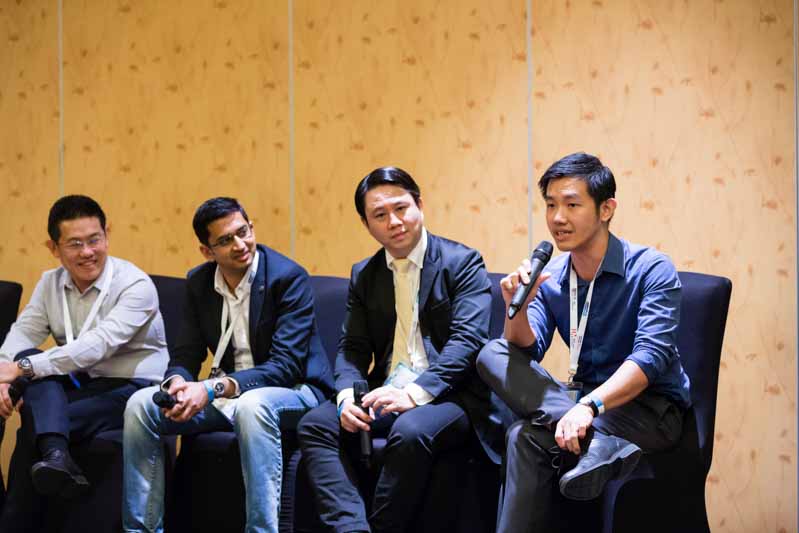
Above photo: Mr. Allan Phua (right) speaking at the National Super Computing Centre (NSCC) Forum during Innovfest Unbound 2017. Also at the Forum were : Prof. Tan Tin Wee (not in photo), Director, National Supercomputing Centre Singapore; (from left) Mr. Jon Lau, Deputy Director, National Supercomputing Centre Singapore; Dr. Saumya Jamuar, Co-Founder & Co-Chief Scientific Officer, Global Gene Corp; Mr. Fabian Ong, Manager, Keppel Data Centre. Photo: NUS Enterprise
The Data Innovation Programme Office (DIPO) is one of the latest and newest offices at IMDA, as announced by Senior Minister of State for Communications and Information Dr. Janil Puthucheary in March 2017 at the Committee of Supply during the Budget Debate. OpenGov had the opportunity to speak to Mr. Allan Phua, Director at DIPO, in an email interview to find out more about the origins of the new office, as well as some of the early projects being carried out by DIPO.
Background
In a digitalised world, data is increasingly ubiquitous and Singapore recognises that data should be treated and developed as a resource, similar to other conventional assets such as property or human capital. As a new frontier technology focus area, IMDA takes a collaborative approach between industry and Government to catalyse data-driven innovations. Singapore also recognises that there are many areas within the data ecosystem to capitalise on, such as data processing, analytics, security, standards and more. Enterprises themselves are beginning to realise opportunities and benefits of such data analysis.
Obvious benefits include cost reductions, optimised tracking of inventory and increased revenue. Data owners across sectors are also beginning to view their datasets as not only fundamentally valuable, but also economically viable to distribute, resulting in a growing marketplace for data. While the use of data and data analytics present enormous opportunities, there are pre-requisites that companies must have overcome to fully harness the potential of data science.
Mr. Phua explained these pre-requisites:
“Firstly, there is a lack of awareness from enterprises on how data science generates value for themselves. Secondly, quality datasets – data is currently fragmented piecemeal and held in proprietary silos with little cross-pollination. There is a need for trusted platforms, standards and solutions for different partners to collaborate, discover and exchange interoperable datasets.
Third, there is a high demand for data scientists and development of enterprise capabilities to leverage on data insights and forward-looking data strategies, coupled with low supply. Finally, a lack of global clarity on data regulations.”
Role of DIPO
DIPO was set up to help companies understand these pre-requisites, as well as encourage a progressive use of data science. Its ambit includes: generating awareness of data’s value; ensuring a steady pipeline of talent; building up local research capabilities; creating infrastructure for data flows and exchange; working with industry stakeholders to understand their business needs; and constructing enabling, progressive and transparent regulations.
This will work for enterprises at all levels. For example, one early but surprising data challenge is that of creating better integration of inventory data across a retail company’s set of stores and their entire supply chain – this could lead to faster re-stocks as well as better and more efficient allocations and movement of resources, benefitting multiple sectors. In this example it could advance the logistics, warehousing, retail and manufacturing sectors.
DIPO is a critical player of the Data Science & Artificial intelligence tech focus area, one of four which IMDA is building.
Early projects
One of the early projects that laid the groundwork for DIPO is Data Quality Metrics (DQM) Technical Reference (TR41), done in conjunction with the Information Technology Standards Committee. The DQM assists in ascertaining quality differences between datasets through aiding dataset buyers and sellers create a foundational basis of comparison through metrics such as the comparative reliability, relevance, accessibility, timeliness etc. compared to similar datasets from distinct providers. Moving forward, DIPO will leverage IMDA programmes such as the TechSkills Accelerator (TeSA) and SMEs Go Digital. With TeSA, DIPO will help to develop and train data science talents in Singapore; while with SMEs Go Digital, DIPO will drive Small and Medium Enterprises (SMEs) to harness the value of data.
SMEs Go Digital is a structured and inclusive approach towards assisting SMEs in their adoption of digital technologies and building digital capabilities. Solutions which SMEs adopt will enable them to begin collecting, analysing and acting on data to make informed business decisions.
Combined, these programmes channel IMDA’s goals to help companies to digitalise their businesses and seize opportunities for growth in order to continue to develop a strong infocomm media foundation to support a Digital Economy for a Smart Nation.
Besides DIPO’s goals in Data Science & Artificial Intelligence, IMDA has identified three other areas of disruption to develop for their potential capabilities to catalyse industries, spur productivity and improve citizen lives. They are: Cybersecurity; the Internet of Things; and Immersive Media.
















